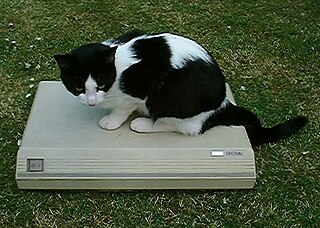Program, programme, programmer, or programming may refer to:

A vocoder is a category of speech coding that analyzes and synthesizes the human voice signal for audio data compression, multiplexing, voice encryption or voice transformation.
A signal generator is one of a class of electronic devices that generates electrical signals with set properties of amplitude, frequency, and wave shape. These generated signals are used as a stimulus for electronic measurements, typically used in designing, testing, troubleshooting, and repairing electronic or electroacoustic devices, though it often has artistic uses as well.
Speech synthesis is the artificial production of human speech. A computer system used for this purpose is called a speech computer or speech synthesizer, and can be implemented in software or hardware products. A text-to-speech (TTS) system converts normal language text into speech; other systems render symbolic linguistic representations like phonetic transcriptions into speech. The reverse process is speech recognition.

Digital music technology encompasses digital instruments, computers, electronic effects units, software, or digital audio equipment by a performer, composer, sound engineer, DJ, or record producer to produce, perform or record music. The term refers to electronic devices, instruments, computer hardware, and software used in performance, playback, recording, composition, mixing, analysis, and editing of music.
Receiver or receive may refer to:

Vincent John Martin, known professionally as Vince Clarke, is an English synth-pop musician and songwriter. Clarke has been the main composer and musician of the band Erasure since its inception in 1985, and was previously the main songwriter of several groups, including Depeche Mode, Yazoo, and the Assembly. In Erasure he is known for his deadpan and low-key onstage demeanour, often remaining motionless over his keyboard, in sharp contrast to vocalist Andy Bell's animated and hyperactive frontman antics.
Synthesis or synthesize may refer to:
Pad or pads may refer to:
A fingerprint is a mark made by the pattern of ridges on the pad of a human finger.
An alter ego is an alternate personality or persona.

DECtalk was a speech synthesizer and text-to-speech technology developed by Digital Equipment Corporation in 1983, based largely on the work of Dennis Klatt at MIT, whose source-filter algorithm was variously known as KlattTalk or MITalk.

A ceramic resonator is an electronic component consisting of a piece of a piezoelectric ceramic material with two or more metal electrodes attached. When connected in an electronic oscillator circuit, resonant mechanical vibrations in the device generate an oscillating signal of a specific frequency. Like the similar quartz crystal, they are used in oscillators for purposes such as generating the clock signal used to control timing in computers and other digital logic devices, or generating the carrier signal in analog radio transmitters and receivers.

A synthesizer is an electronic musical instrument that generates audio signals. Synthesizers typically create sounds by generating waveforms through methods including subtractive synthesis, additive synthesis and frequency modulation synthesis. These sounds may be altered by components such as filters, which cut or boost frequencies; envelopes, which control articulation, or how notes begin and end; and low-frequency oscillators, which modulate parameters such as pitch, volume, or filter characteristics affecting timbre. Synthesizers are typically played with keyboards or controlled by sequencers, software or other instruments, and may be synchronized to other equipment via MIDI.
Prodigy, Prodigies or The Prodigy may refer to:
"On the Run" is the third track from British progressive rock band Pink Floyd's 1973 album, The Dark Side of the Moon. It is an instrumental piece performed on an EMS synthesizer. It deals with the pressures of travel, which, according to Richard Wright, would often bring fear of death.

A sound chip is an integrated circuit (chip) designed to produce audio signals through digital, analog or mixed-mode electronics. Sound chips are typically fabricated on metal–oxide–semiconductor (MOS) mixed-signal chips that process audio signals. They normally contain audio components such as oscillators, envelope controllers, samplers, filters, amplifiers, and envelope generators.






